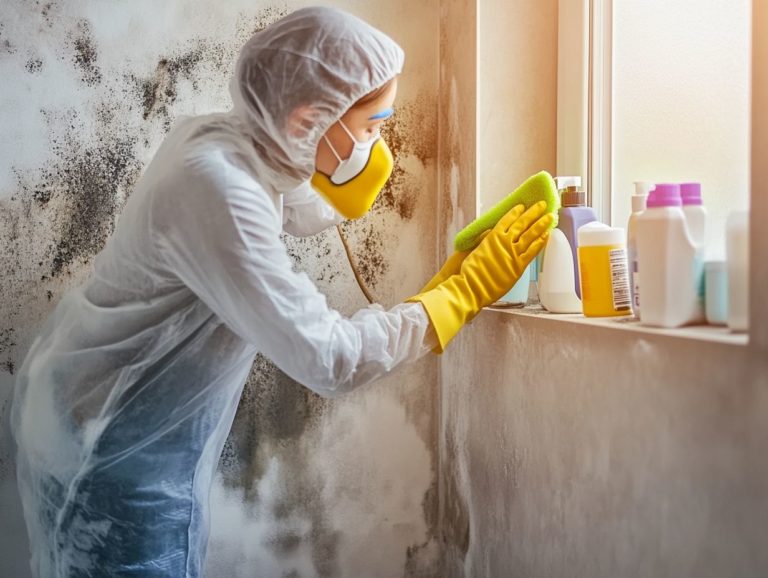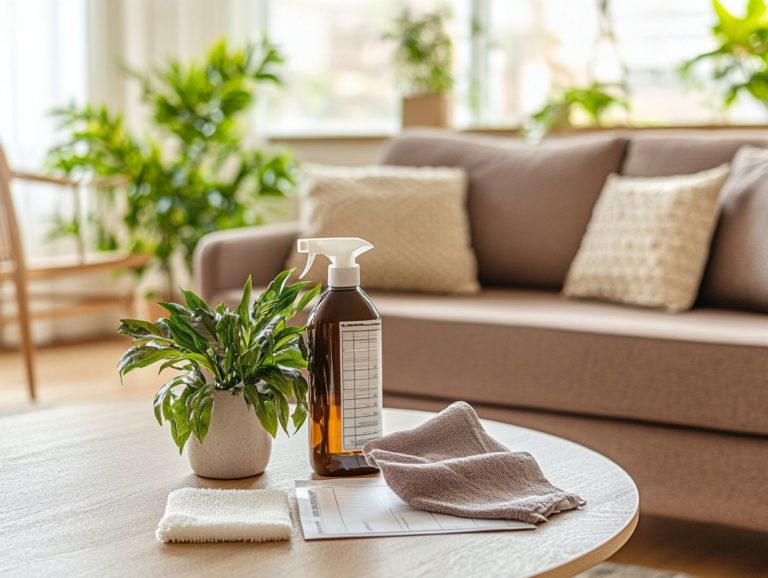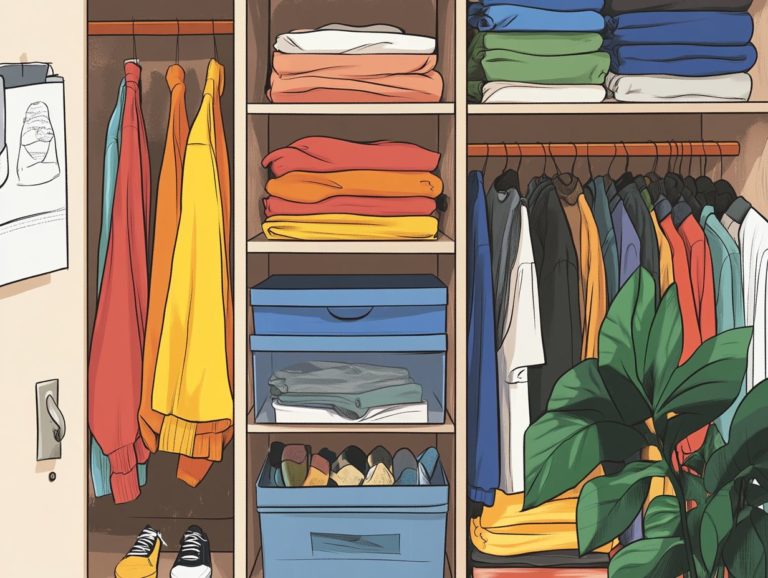How to Handle Cleaning Emergencies
Cleaning emergencies have a knack for appearing at the most inconvenient moments, transforming a tranquil day into a scene of utter chaos. Whether it s an unexpected spill, a pet mishap, shattered glass, or an unwelcome mold outbreak, having swift and effective cleaning solutions at your fingertips is crucial. Remember, procrastination leads to bigger problems, so it s best to act quickly!
This guide is designed to help you recognize common cleaning emergencies, prepare yourself for them, and create a robust action plan. It also emphasizes the essential supplies you should keep readily available and advises when it s wise to enlist the help of professionals, such as a plumber or a home inspector. Get ready to tackle those messes head-on and with confidence!
Contents
- Key Takeaways:
- What Are Cleaning Emergencies?
- How to Prepare for Cleaning Emergencies?
- What Are the Most Common Cleaning Emergencies?
- How to Handle Different Types of Cleaning Emergencies?
- When Should You Call a Professional for Cleaning Emergencies?
- Frequently Asked Questions
- How to Handle Cleaning Emergencies: What are some common cleaning emergencies that can occur in a home?
- How to Handle Cleaning Emergencies: What steps should be taken when a spill occurs on carpet or furniture? And how to handle dirty dishes?
- How to Handle Cleaning Emergencies: What is the best way to handle a clogged drain or toilet?
- How to Handle Cleaning Emergencies
Key Takeaways:
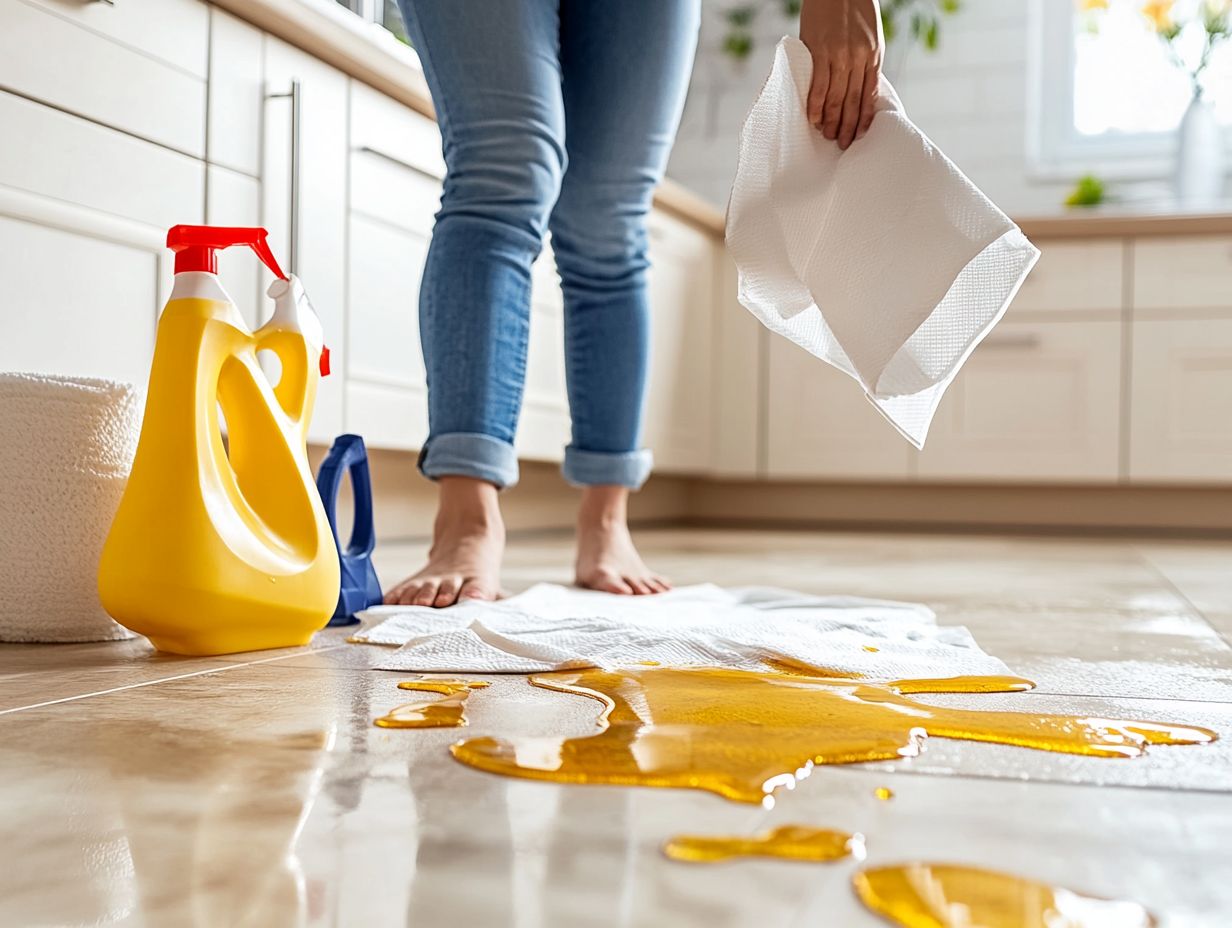
- Be prepared for cleaning emergencies by keeping essential supplies ready, like garbage bags and cleaning solutions.
- Recognize common cleaning emergencies, including spills, broken items, pet accidents, and mold.
- Decide when to manage a cleaning emergency yourself and when to call in a pro.
What Are Cleaning Emergencies?
Cleaning emergencies are those unforeseen events that demand your immediate attention, often triggered by accidents or failures that can jeopardize the safety and hygiene of your home. These situations include problems like water leaks, kitchen fires, and even the presence of carbon monoxide each of which can be dangerous for your health.
By adopting a proactive approach to emergency cleaning, you not only restore order but also ensure that your living environment remains safe, particularly when a home inspector is set to evaluate your property.
How to Prepare for Cleaning Emergencies?
When preparing for cleaning emergencies, take a strategic approach to ensure you have the right tools and knowledge at your fingertips for those unexpected situations. Gather the right tools and information. This way, you’re ready for sudden spills or fires.
To effectively tackle any cleaning crisis, it s vital to stock up on essential cleaning supplies, including safety gear, garbage bags, and effective cleaning solutions. This helps keep your space safe and organized!
You can also use temporary organization techniques like the 20/10 work method to speed up clean-ups, enabling you to respond efficiently to any challenge that arises.
What Supplies Should You Have on Hand?
Having the right cleaning supplies at your fingertips is essential for effectively tackling unexpected cleaning emergencies. You ll want to stock up on a variety of cleaning solutions, such as vinegar spray and bleach, to handle a range of stains and odors. Don t underestimate the importance of garbage bags, mops, and vacuums; these tools help you clean up effectively, whether it s dealing with dirty dishes, spills, or other household messes. Keeping smoke detectors and carbon monoxide detectors in working order can also prevent certain emergencies from escalating.
Beyond these foundational tools, consider adding microfiber cloths and scrub brushes to your arsenal. Microfiber cloths are superb for trapping dust and dirt without leaving streaks behind, making them perfect for surfaces like glass and countertops. Meanwhile, scrub brushes are your best friends when it comes to tackling tougher grime, particularly in bathrooms or kitchens. For an added touch, use essential oils or citrus-based fresheners to keep your home smelling fresh.
To elevate your cleaning routine, think about incorporating essential oils or fresheners to provide a pleasant scent while neutralizing any unwelcome odors in your space. Keeping these items readily available not only enhances the effectiveness of your clean-up efforts but also contributes to a healthier home environment.
How to Create a Cleaning Emergency Plan?
Creating a cleaning emergency plan involves outlining clear steps for when a cleaning crisis strikes. This ensures everyone in your household understands their roles and responsibilities. A proactive approach minimizes chaos during emergencies and discourages procrastination that could lead to greater complications.
Having a designated place for obvious trash and keeping flat surfaces clear can make clean-ups quicker.
Detail each phase of the clean-up, including emergency sanitation measures. You ll be better equipped to tackle unexpected cleaning challenges.
To establish such a plan, start by identifying potential cleaning emergencies think spills, accidents, or more significant events like flooding, fire damage, or even a gas leak. Assign specific tasks to each household member based on their abilities and proximity to the problem, so no one feels overwhelmed.
The phases can include assessment, action, and recovery, emphasizing the importance of a rapid response. This preparedness promotes organization and fosters teamwork, enabling swift action that can significantly mitigate the aftermath of any cleaning emergency. Playing music makes the clean-up process more enjoyable.
What Are the Most Common Cleaning Emergencies?
Understanding the most common cleaning emergencies is essential for managing your home effectively. These situations can strike without warning and demand immediate attention. Regularly checking smoke detectors and carbon monoxide detectors helps you stay ahead of potential disasters.
Common emergencies include spills and stains from food or drinks, shattered glass or dishes, pet accidents, and the unwelcome appearance of mold or mildew. Each of these can quickly disrupt your living space. Always have a plan and the necessary cleaning supplies to handle these issues swiftly.
By recognizing these potential emergencies, you can respond promptly and efficiently, employing the right cleaning solutions and techniques to restore order and cleanliness.
1. Spills and Stains
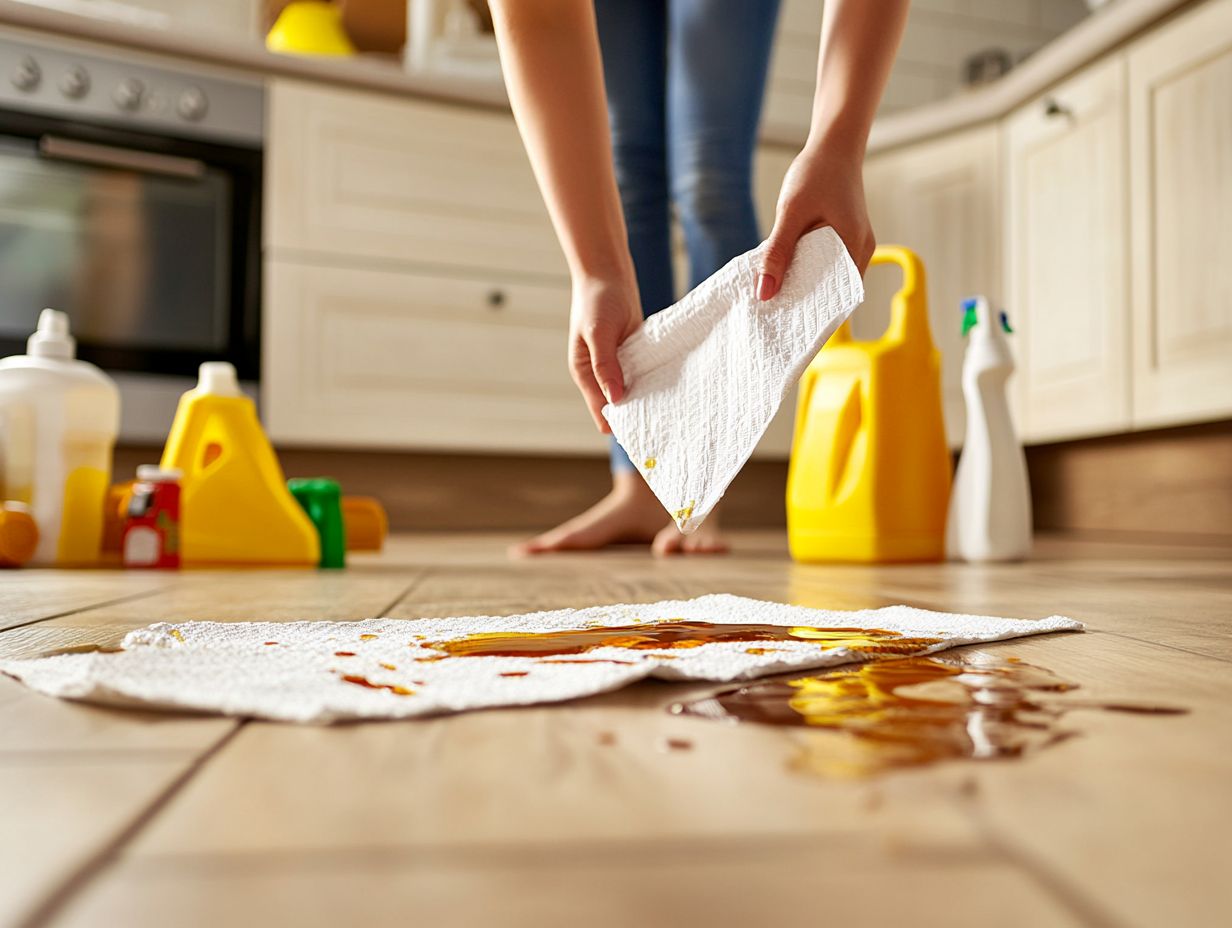
Spills and stains are among the most common cleaning emergencies at home, often caused by everyday activities like cooking or hosting friends. Each type of spill whether it s red wine, coffee, or food demands its own specific cleaning solution.
For instance, a vinegar spray works wonders for general stains, while tougher, set-in marks might need the effectiveness of bleach. Act quickly to prevent permanent damage to your carpets, upholstery, and hard surfaces.
Knowing where stains come from helps you act fast in choosing the right cleaning method. For example, oil-based spills from food or greasy substances may require a degreaser, which is a cleaning product that removes grease and oil. On the other hand, water-based stains typically respond well to a simple mix of baking soda and water.
Act quickly to prevent stains from setting in; gently blotting the area with a clean cloth will help keep the liquid from seeping deeper into the fibers. Investing in long-term preventative measures, like applying stain-resistant treatments to your surfaces, can drastically cut down on pesky cleaning emergencies.
Mastering the right techniques empowers you to create and maintain a cleaner, stain-free environment. Start by making your bed every morning to set a positive tone for the day.
2. Broken Glass or Dishes
Broken glass or dishes are cleaning emergencies that pose safety risks. Address them immediately.
First, wear personal protective equipment, like gloves, to shield yourself from injuries while gathering the shards. Using a vacuum can be particularly effective for picking up those pesky smaller pieces of glass, ensuring that your kitchen or living area remains safe and free from hazards.
After vacuuming, make sure to properly dispose of any remaining debris to prevent future accidents. Wearing closed-toe shoes protects your feet and adds an extra layer of protection.
In terms of cleaning up, opt for a dustpan to sweep up larger pieces instead of picking them up by hand; this approach minimizes the risk of cuts.
Once you’ve collected the glass, double-bagging it in a sturdy container is crucial for safe disposal, preventing any accidental punctures. To avoid such accidents in the future, consider placing non-slip mats under dishes and practicing mindful handling techniques.
Maintaining a clutter-free environment can also significantly reduce the chances of breakage, making your cleaning routine not only safer but also more efficient.
3. Pet Accidents
Pet accidents are an unfortunate reality of pet ownership, and if not addressed promptly, they can escalate into significant cleaning emergencies.
To tackle these situations effectively, reach for suitable cleaning supplies specifically designed to neutralize odors and stains. Enzymatic cleaners special cleaners that break down stains and odors caused by pet waste work wonders in resolving these incidents.
By intervening quickly, you not only keep your home smelling fresh but also deter your pet from returning to the same spots.
When mishaps occur, it’s vital to act swiftly. Start by blotting the area with paper towels to absorb as much liquid as possible. Once you’ve done that, applying a pet-safe cleaner will ensure that underlying odors are completely eradicated.
Running a vacuum over the area afterward can also help remove any lingering debris. Establishing a routine for cleaning your pet’s living areas and bedding can dramatically reduce the chances of future accidents.
Consistent potty training, coupled with regular bathroom breaks, contributes significantly to prevention. And let s not forget the power of positive reinforcement it encourages the desired behavior and strengthens your bond with your furry friend.
Consider adding a few laundry steps to your routine to keep your pet’s items fresh and clean.
By following these steps, you can maintain a clean and inviting home while fostering a healthy environment for both you and your beloved companion.
4. Mold or Mildew
Mold and mildew outbreaks are common cleaning emergencies that can emerge from damp conditions or a water leak. They demand your immediate attention to avert potential health risks.
Act quickly to remove mold and mildew. This is crucial for keeping your home safe. It s essential to use specific cleaning solutions designed to tackle mold and mildew, such as bleach or specialized commercial mold removers, to ensure effective remediation.
These fungi flourish in areas with high humidity, inadequate ventilation, or leaks, often leading to respiratory issues, skin irritation, or other allergic reactions in those exposed. Regular inspection by a home inspector can help identify these problem areas early.
Addressing the situation goes beyond mere cleaning; it involves grasping the root cause and preventing future outbreaks. Start by identifying the affected areas and eliminating moisture sources, which may include fixing leaks or enhancing ventilation.
In some cases, consulting a heating and cooling expert may be necessary to ensure proper air circulation. Then, don your protective gear and employ the right cleaning solutions to scrub the surfaces meticulously.
Don’t forget to have garbage bags handy for disposing of contaminated materials. Once you’ve tackled the immediate issue, ensure the area dries thoroughly and conduct regular inspections to thwart any recurrence.
By following these steps, you can maintain a safe and hygienic living space for yourself and your loved ones. Incorporate regular use of cleaning supplies like a mop and vacuum to keep your home free from dust and allergens.
How to Handle Different Types of Cleaning Emergencies?
Effectively managing various cleaning emergencies demands a customized strategy, as each scenario presents its own distinct challenges and potential hazards. Whether it’s dealing with dirty dishes after a party or a sudden kitchen fire, having a plan in place can make all the difference.
By familiarizing yourself with appropriate procedures, including the selection of effective cleaning products and the use of personal protective equipment, you can ensure a safe and efficient clean-up process. This expertise reduces the risk of injury and significantly enhances the effectiveness of your emergency response efforts. Act fast! Procrastination leads to bigger problems down the road.
1. Spills and Stains
To tackle spills and stains with finesse, immediate clean-up is essential to prevent lasting damage, particularly on carpets and fabrics. Begin by gently blotting the affected area with a clean cloth to soak up any excess liquid. Then, introduce the right cleaning product think vinegar spray or cleaners tailored for specific stains.
It’s essential to understand the nature of the spill. For oily stains, such as those from cooking oil or grease, a dry cleaning solvent works wonders. Conversely, for water-based stains, a mild detergent mixed with water is your best tool. When it comes to red wine mishaps, use salt to absorb the liquid before applying a blend of hydrogen peroxide and dish soap.
Regular use of laundry techniques can also help keep your fabrics in pristine condition. To maintain the beauty of your carpets, invest in professional cleaning every 12-18 months, and always attend to spot cleaning right after accidents. This ensures your living space remains immaculate and inviting.
Implement temporary organization strategies to reduce clutter and make cleaning easier. Remember, a quick response is crucial; don t wait until it s too late!
2. Broken Glass or Dishes
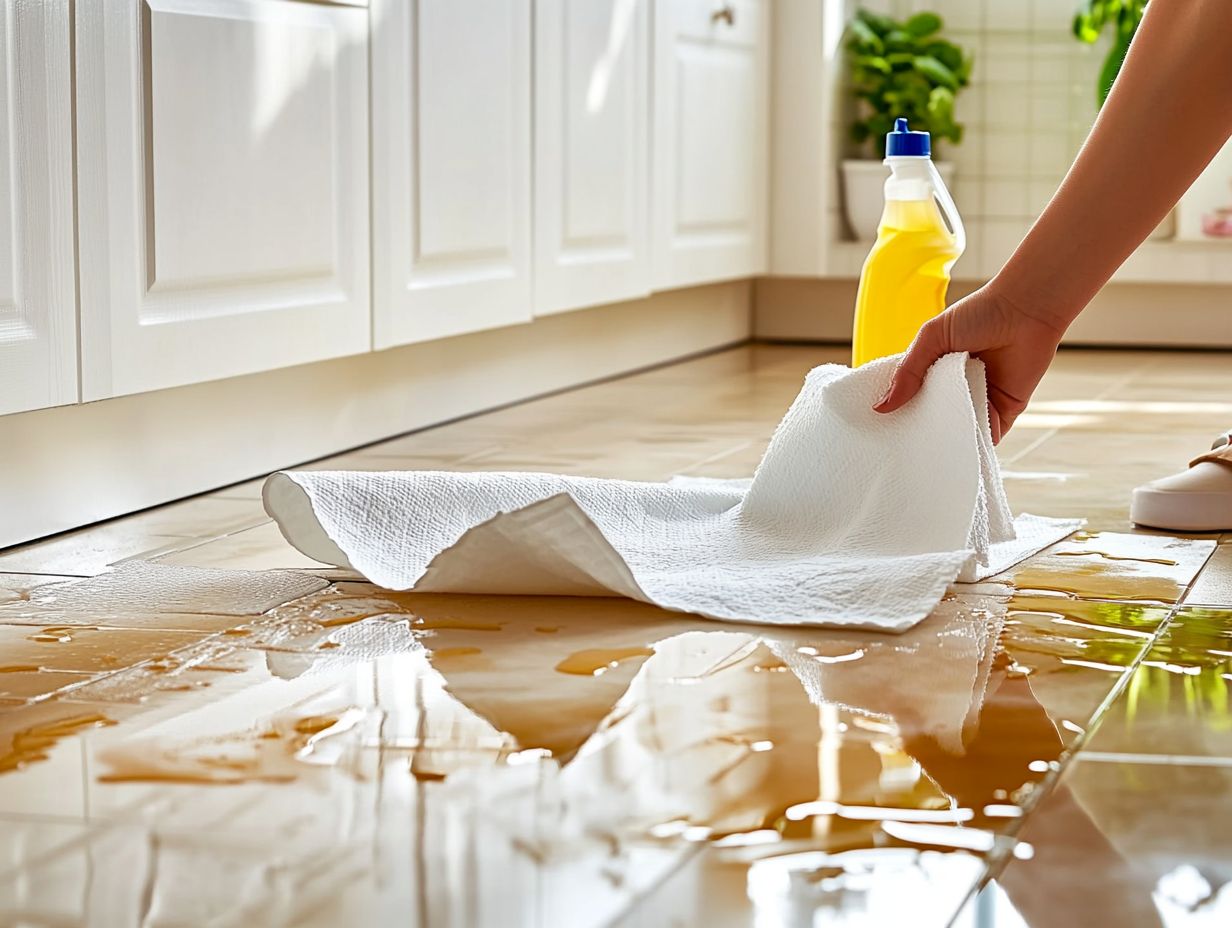
When you encounter broken glass or dishes, prioritizing safety is paramount. Equip yourself with personal protective gear, like gloves, before diving into the clean-up. Carefully pick up the larger pieces by hand, while a broom is your best tool for those pesky smaller shards. Take your time to ensure that no fragments are left behind; this diligence will help you avoid any unfortunate injuries later on.
After collecting the visible pieces, grab a damp paper towel or cloth to catch any tiny shards that may have eluded your notice. This simple yet effective step greatly diminishes the risk of cuts.
Once all debris has been collected, dispose of the glass and ceramics in a sturdy container ideally one that’s labeled to inform others of its contents. Safety protocols dictate avoiding sweeping with your bare hands and keeping pets and children well away from the area.
Implementing non-slip mats and thoughtfully storing fragile items helps prevent future breakages, ensuring that your space remains safe and organized. Remember to act quickly and keep your environment safe!
3. Pet Accidents
In case of pet accidents, acting swiftly to clean up the mess and neutralize any lingering odors is essential. Opt for cleaning products specifically designed for pet stains; these cleaners break down the compounds that lead to unpleasant smells, ensuring your home stays fresh.
To effectively address these incidents, start by blotting up any excess liquid with paper towels or cloths, absorbing as much as possible before applying the cleaner. A gentle scrubbing motion is useful, but be cautious excessive pressure could inadvertently spread the stain further. After treating the area, consider using an ultraviolet light to identify any missed spots.
Regular maintenance, such as promptly addressing accidents and reinforcing positive behavior, can significantly decrease the chances of future mishaps. For preventive measures, consider using training tools like pee pads or crate training, which help instill good habits.
Incorporating products with natural scents can also encourage your pet to return to designated bathroom areas. Additionally, watch for signs of carbon monoxide poisoning during winter months when pets are indoors more frequently. Start your cleaning process now to maintain a clean and healthy home!
4. Mold or Mildew
To tackle mold or mildew effectively, it s crucial for you to pinpoint the source of moisture and take steps to lower humidity levels in the affected area. Once you’ve identified the culprit, employ powerful cleaning solutions such as bleach or specialized mold removers to eradicate the growth.
Don t forget to don appropriate personal protective equipment to safeguard yourself during the clean-up process. Keep garbage bags nearby to dispose of any mold-contaminated materials properly.
Begin by ensuring proper ventilation, and then inspect areas prone to dampness think bathrooms, kitchens, or basements. Keep a close eye on smoke detectors and carbon monoxide alarms in these areas to ensure they are functioning correctly.
To maintain a low indoor humidity level, consider using dehumidifiers or air conditioners. Make it a habit to run exhaust fans during cooking and showering.
For long-term prevention, be proactive about repairing any leaks in plumbing or roofing. Keep your gutters clean to prevent water from pooling around your foundation.
Using mold-resistant paint, which is designed to prevent mold growth, and materials in moisture-prone areas can be highly effective. Check and maintain your prevention strategies regularly to keep mold at bay!
A routine inspection by a plumber can help identify potential issues before they escalate.
When Should You Call a Professional for Cleaning Emergencies?
Recognizing when to enlist a professional for cleaning emergencies is essential, particularly when faced with severe damage or contamination that surpasses your skill set.
If you encounter hazardous scenarios such as shattered glass, mold infestations, or significant water damage it s wise to reach out for expert assistance. For instance, a landlord should be notified immediately in case of a gas leak or other major issues.
If the situation becomes overwhelming or you find yourself lacking the necessary resources to tackle the issue, professional cleaning services can deliver the expertise required for an effective resolution.
1. Severe Damage or Contamination
When you encounter severe damage or contamination, such as extensive water damage from a flood or a significant mold outbreak, you must act fast! Immediate action is essential, often requiring the expertise of professional cleaning services.
These scenarios not only present health risks but can also lead to lasting structural damage if not addressed promptly and effectively. Don’t overlook the importance of emergency sanitation measures in these situations to maintain a safe environment.
In such emergencies, the risk of long-term health issues escalates significantly due to the potential for toxic mold spores and bacteria to flourish in the affected areas. Engaging professional cleaning services provides you with a wealth of expertise.
They utilize specialized equipment and techniques to safely remove hazardous materials while also repairing any damage that has occurred. Take, for instance, a sewage backup experts are crucial for handling biohazardous waste, which refers to waste that poses a threat to human health or the environment, properly.
Recognizing the gravity of these types of contamination highlights the urgent need for swift intervention by trained professionals. They can guarantee thorough remediation and restore safety to the spaces affected, allowing you to return to a secure and healthy environment.
Keep an eye out for any potential toxic mold spores that may form as a result of these incidents.
2. Lack of Time or Resources
When you find yourself in the midst of a cleaning emergency, with time and resources in short supply, turning to professional cleaning services can be a game changer. These experts handle tasks efficiently, allowing you to focus on other priorities while keeping your home clean and safe.
In today s fast-paced world, balancing work commitments, family responsibilities, and personal time often leaves little room for unexpected messes. When situations like sudden spills, pet accidents, or surprise guests happen, the added stress can become overwhelming.
By hiring professionals, you not only relieve immediate pressure but also gain access to specialized tools and techniques that can restore order much faster than if you were to do it alone. They excel at tackling various cleaning challenges and delivering thorough deep cleans that contribute to a healthier home environment. To maximize your productivity, consider using the 20/10 work method: work for 20 minutes, then rest for 10.
Outsourcing your cleaning emergencies allows you to reclaim control over your day, directing your energy toward issues that truly need your attention. Start by addressing obvious trash first and keeping flat surfaces clear of clutter.
3. Safety Concerns
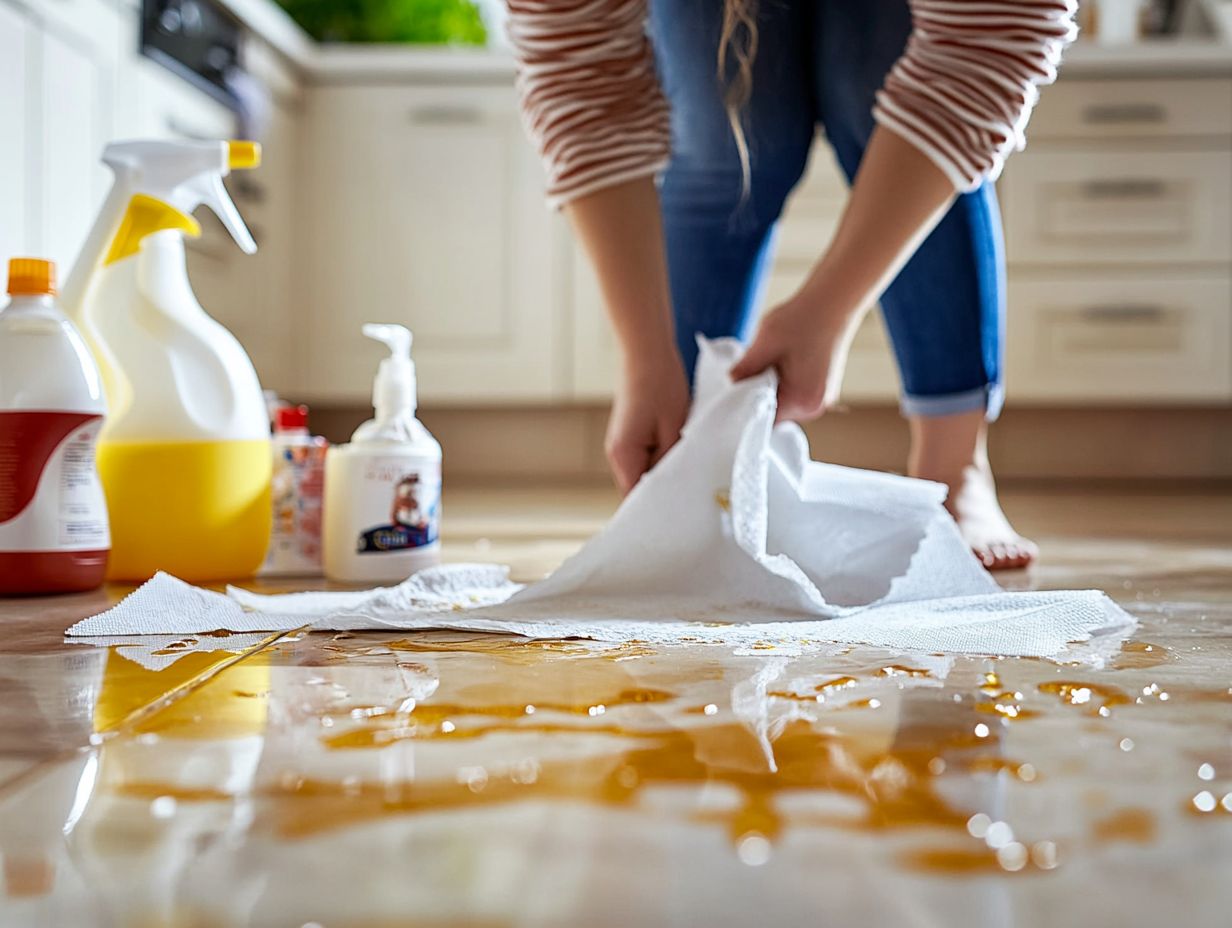
Ensuring safety during cleaning can start simply make your bed. This small act sets a positive tone for the rest of your tasks. Always stay alert for gas leaks and check that smoke detectors are working properly.
In cleaning emergencies, safety should be your top priority. Hazardous materials like chemicals, broken glass, or extensive mold can pose serious risks. In such cases, it s crucial to call in professional cleaning services with the expertise and equipment necessary to manage these risks safely. Always use appropriate cleaning solutions and keep a well-stocked supply of essentials like garbage bags and a mop.
These situations can hide serious dangers! For example, mold spores can cause respiratory issues, and chemical exposure can lead to skin irritations. Professionals know the protocols for handling such hazards and are equipped with safety gear to protect themselves. They also use tools like vacuums with HEPA filters to ensure thorough cleaning.
Experts evaluate the situation thoroughly, ensuring all safety measures are in place from proper waste disposal to using eco-friendly cleaning agents. By enlisting their help, you can effectively reduce risks and ensure compliance with local health regulations, fostering a safer environment for everyone involved. Regular inspections by a home inspector can also identify potential issues before they escalate.
Frequently Asked Questions
How to Handle Cleaning Emergencies: What are some common cleaning emergencies that can occur in a home?
Some common cleaning emergencies at home include spills on carpets or furniture, clogged drains or toilets, water leaks, gas leaks, kitchen fires, and unexpected messes from pets or children.
How to Handle Cleaning Emergencies: What steps should be taken when a spill occurs on carpet or furniture? And how to handle dirty dishes?
Quickly blot up as much of the spill as possible using a clean cloth or paper towels. Then, apply a cleaning solution designed for the specific stain and follow the instructions. For natural solutions, consider using a vinegar spray or citrus-based cleaner. If the stain persists, hiring a professional cleaner may be necessary.
How to Handle Cleaning Emergencies: What is the best way to handle a clogged drain or toilet?
If you have a plunger, try using it to unclog the drain or toilet. If that doesn’t work, use a drain snake to remove any obstructions. Sometimes, adding a bit of bleach can help break down the clog. If the clog persists, it may be time to call a plumber for assistance.
How to Handle Cleaning Emergencies
Quick Cleanup for Unexpected Messes
Keep cleaning wipes or paper towels and a multipurpose cleaner ready for swift cleanups. For pet messes, use a special cleaner that removes odors effectively.
Designate a spot for your cleaning supplies in an easy-to-reach location. Don t wait address those messes as soon as they occur!
Breaking Something While Cleaning
If you break something valuable or sentimental, gather the broken pieces carefully. For small items, clean up the mess yourself.
But if you break something large or sharp, it’s safer to call a professional cleaner. Always have a garbage bag nearby to collect debris safely.
Preventing Cleaning Emergencies
While you can t avoid all messes, you can reduce the risk. Regular maintenance of plumbing and appliances is essential.
Use protective covers on your furniture and carpets. Teach children and pets about cleaning rules, and make sure your smoke and carbon monoxide detectors are working.


